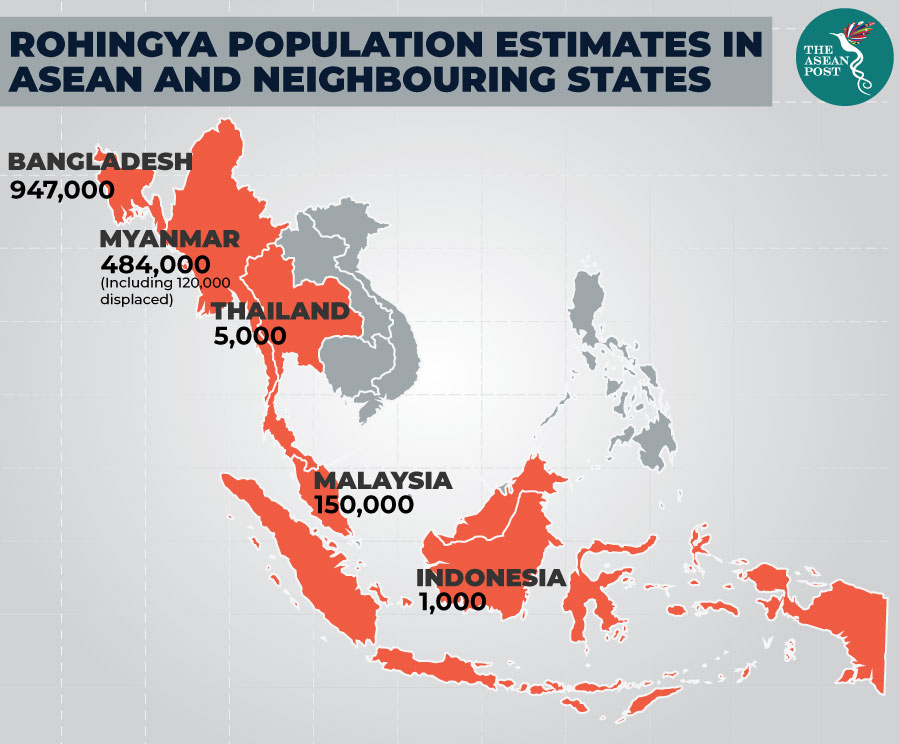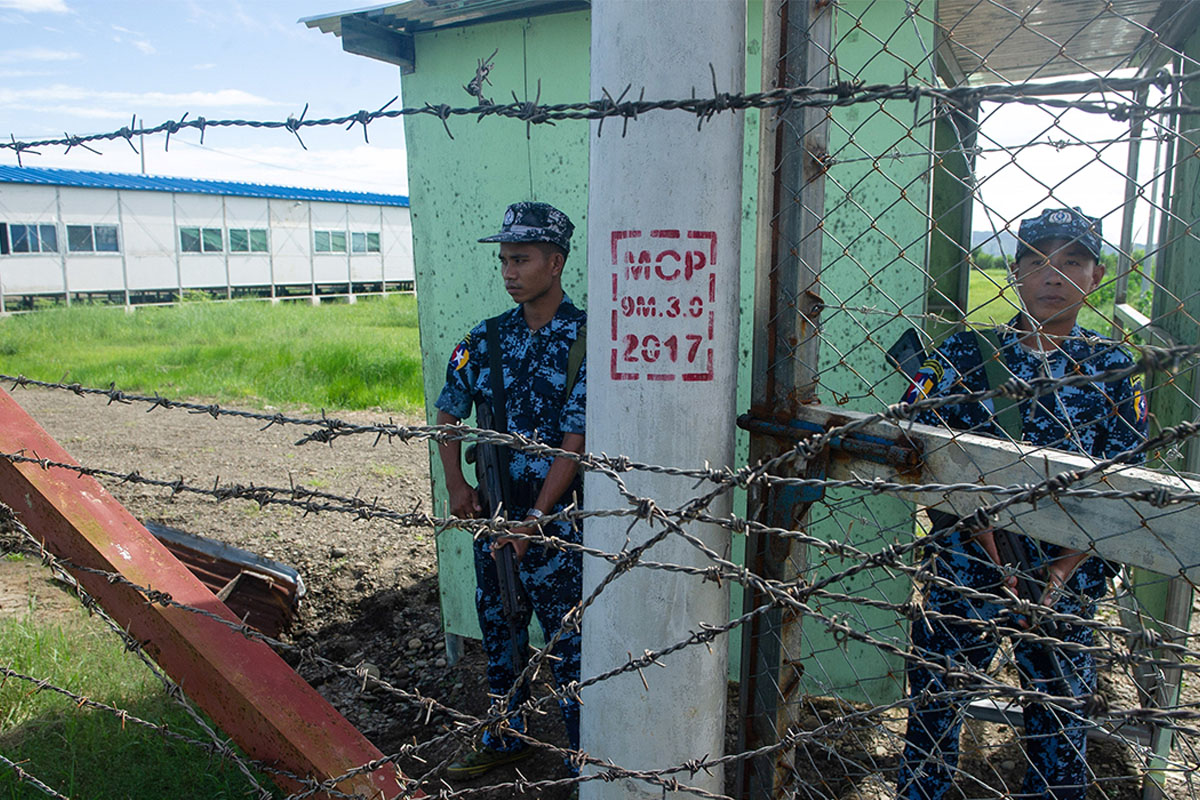As Muslims worldwide celebrate the end of fasting for the holy month of Ramadan, a growing diaspora of Rohingya face the prospect of observing their faith under squalid, cramped conditions in refugee camps such as Cox’s Bazar in Bangladesh.
Dubbed the most persecuted peoples in the world, the Rohingya are an Indo-Aryan speaking people from the Rakhine state in Myanmar, with Islamic influences tracing from intermarriage and conversion by Arab traders in the eighth and ninth centuries.
The Rohingya situation in Myanmar is a domestic humanitarian crisis with larger implications for the Association of Southeast Asian Nations (ASEAN) and the world. As the diaspora of this persecuted ethnicity finds its way to shores all around the region, its impacts have shone a harsh spotlight on the shortcomings of the association’s core founding principles of non-interference.
Repatriation initiatives such as the 15 January joint working group dialogue between Bangladesh and Myanmar have proceeded slowly, with just 878 out of an initial list of 8,032 refugees approved.
More than one million Rohingya Muslim refugees have fled Myanmar since the 1970s, according to estimates by the United Nations High Commissioner for Refugees (UNHCR) and the International Organisation for Migration. Of these, 1,000 were displaced to Indonesia, 5,000 to Thailand and 150,000 to Malaysia to date.
In addition, 120,000 Rohingya have been displaced in Myanmar itself as the Burmese Tatmadaw continue “clearance operations” within the Rakhine state. The socio-political, economic and ethical consequences of ignoring this modern-day Exodus are both a Gordian Knot and Rorschach test facing ASEAN’s current generation of leaders.

Indifference of the majority
Unfortunately, while the response of individual member nations has varied, ASEAN as a whole has drawn global criticism for its indifference to the plight of the Rohingya, with no mention of the crisis in a statement for a November 2017 summit drafted by the Philippines.
As regional leaders turn a blind eye, this has made estimates as to the economic impacts of incoming refugee populations on affected nations problematic. However, the socio-political and ethical implications are clear.
The Rohingya crisis as a whole illustrates the difficulty and contradictions inherent in policing a regional association of nations while abiding by non-interference clauses, such as those set out in the Bangkok Declaration of 1967.
Such clauses are necessary in any transnational organisation, without which there would be no guarantee that sovereignty over domestic issues would be officially observed.
In this sense, intervention is defined as any action, ranging from military excursions to sponsorship of political movements, designed to change existing structures of political authority. This definition is necessary as even commentary on the status quo is often decried by regional leaders as interference in their internal governance.
For more than 50 years, ASEAN’s non-interference principles have only been grossly contravened twice: once in 1986, when the organisation called for a peaceful resolution to political upheaval in the Philippines amidst the People Power Revolution, and again in 1997 when dealing with the admission of Cambodia into the organisation following a coup by its current Prime Minister, Hun Sen.
Glass houses and stones
However, ASEAN itself traces its roots to a cross-border dispute, having been established as a response to Indonesian agitation against the formation of the Malaysian Federation in 1965.
Indeed, Lee Jones, in his 2010 Pacific Review paper ASEAN’s Unchanged Melody? The Theory and Practice of ‘Non-Interference’ in Southeast Asia posits that non-interference is a hope rather than a promise, with the region’s history rife with cross-border actions propagating the interests of specific socio-political structures among member states.
Even taken with a grain of salt, however, this view is limited to individual moves by discrete interest groups within nations, as opposed to any overt actions by ASEAN as a whole.
As such, the association’s approach to the Rohingya crisis will be instrumental in setting a precedent for its future strategy in dealing with a geopolitical crisis touching upon the interests of multiple member-states and a chance to make amends for its non-action in the 2006 East Timur crisis in Indonesia.
Certainly, internal resolution of the Rohingya crisis seems unlikely, as the head of Myanmar’s civilian government, Aung San Suu Kyi, has been reticent in addressing the situation, though this is speculated to be due to the military junta limiting her influence.
A slap on the wrist
Other possible resolutions to the situation include punitive economic policies such as trade sanctions. However, such measures have been ineffective against Myanmar in the past.
The United States (US), for example, implemented comprehensive sanctions against the nation from 2003 to 2016. However, Myanmar’s total trade increased unabated, from US$6.28 billion in 2001 to US$6.54 billion (2003), US$7.1 billion (2004) and US$8.57 billion (2006).
As a case study, 46 percent of the nation’s apparel exports went to the US in 2001. After the sanctions, exports fell 58 percent in 2005, from US$938 million to US$397 million. Since then, however, it has rebounded, totalling US$1.86 billion in 2015.
In freezing imports from Myanmar, the US forced the nation to seek trade partners elsewhere, which they found in South Korea and Japan. As such, economic sanctions against Myanmar would need to be multilaterally imposed to have any lasting impact upon the current regime.
Malaysia may play a key role in a diplomatic resolution to the crisis, given its proximity to Myanmar, status as an Islamic nation and the large number of Rohingya refugee within its borders.
This comes despite Malaysia’s troubled track record in handling the influx of asylum-seekers, who are not recognised legally, even with UNHCR cards, and remain stateless, often resorting to “parallel” employment and education to get by.
As recently as May, Thai police uncovered the existence of a human trafficking route smuggling ethnic Rohingya into Malaysia in modified express buses via Bangkok.
Unfortunately, larger regional concerns may play second fiddle to internal issues as Malaysia adjusts to changing political horizons under its new Prime Minister Mahathir Mohamad.
While the Mahathir administration has yet to take a stance on the Rohingya issue, some solace can be taken in former Prime Minister Najib Razak’s statement at the Counter-Terrorism Conference (held in Sydney on 17 March) advocating that the Rohingya crisis had ceased to be solely a domestic question for Myanmar., As more ASEAN leaders lend their voices to the debate, hope remains that the regional association will take a more direct hand in the humanitarian tragedy unfolding in its backyard.
